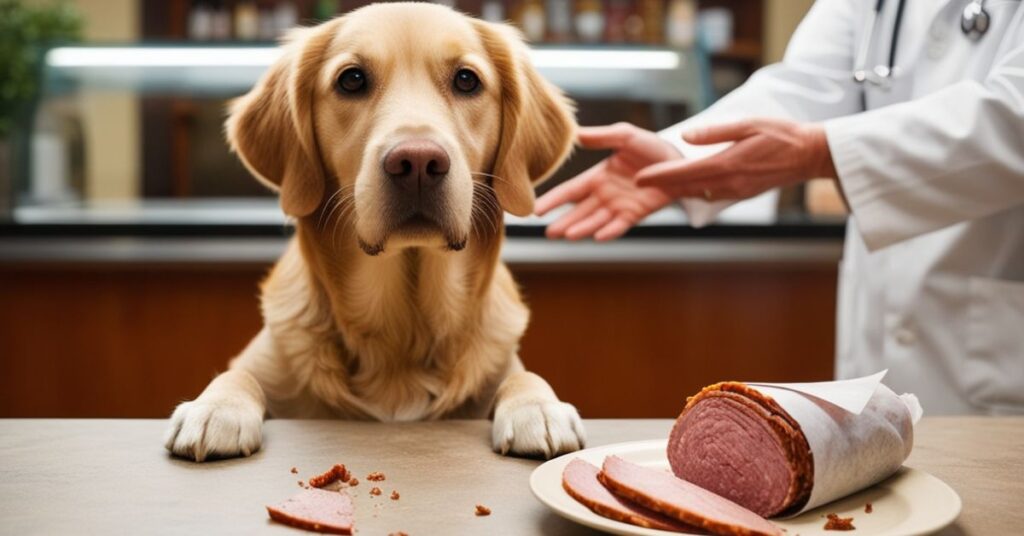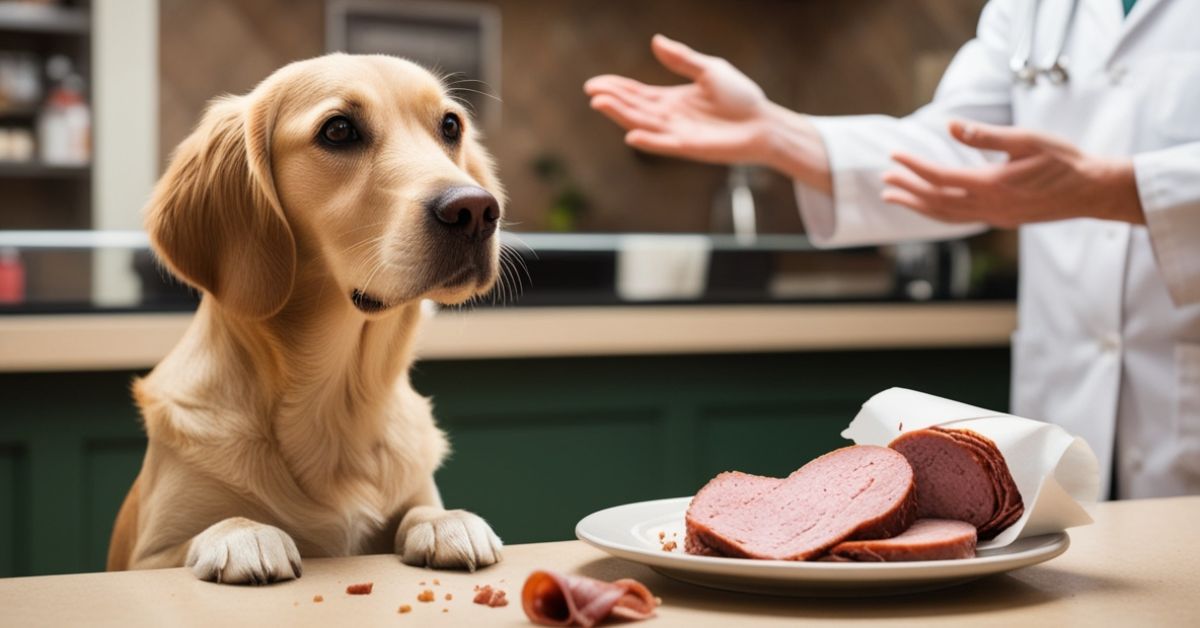When it comes to feeding our furry friends, it’s essential to know what’s safe and what isn’t. Many dog owners are curious about whether pastrami is a safe treat for their canine companions.
With its distinct flavor and preparation process, pastrami may be appealing to dogs, but its ingredients raise some concerns.
In this article, we’ll discuss whether dogs can eat pastrami, break down its ingredients, discuss potential risks, and provide vet-approved advice for pet parents.
Can Dogs Eat Pastrami?
It isn’t generally recommended for dogs due to its high levels of salt content, fat, and spices that can be harmful to dogs’ health. Although a tiny bite might not cause immediate harm, pastrami as a regular treatment can lead to health issues.

Since dogs’ dietary needs differ significantly from humans, feeding them foods designed for us can expose them to risks like salt poisoning, pancreatitis, and digestive distress. As a responsible pet parent, it’s crucial to understand the risks and choose safer alternatives for rewarding your furry friend.
The Basics of Pastrami
It is a type of smoked beef that is brined, cured, seasoned, and often flavored with spices such as garlic and onion powder, black pepper, coriander, mustard seeds, and juniper berries.
These spices contribute to pastrami’s distinct taste but aren’t always safe for dogs. Its preparation often involves soaking in a salty brine, giving it a high sodium content. While this process makes pastrami flavorful for humans, it introduces ingredients that can pose serious risks to dogs.
See Also: Can Dogs Eat Scooby Snacks? – Graham Cracker Snacks For Dogs
Key Facts About Pastrami:

| Nutrient | Per 100g of Pastrami | Potential Effects on Dogs |
| Sodium | ~1000 mg | Risk of salt poisoning |
| Fat | ~20g | Contributes to obesity and pancreatitis risk |
| Protein | ~17g | Useful, but not in this form for dogs |
| Spices | – | Includes toxic foods for dogs like garlic and onion |
Risks of Feeding Pastrami to Dogs
It contains several ingredients that can be harmful to dogs. Here’s why:
- High Salt Content: The salt content in pastrami can exceed safe limits for dogs, leading to salt poisoning if consumed regularly. Sodium ion poisoning can result in vomiting, diarrhea, and even seizures.
- Fat Content: It is a high-fat food. Dogs that consume too much fat are at risk of obesity and pancreatitis, a painful and sometimes life-threatening condition.
- Spices: Many of the spices in pastrami, such as garlic and onion, are toxic to dogs. Even in small amounts, these spices can cause digestive distress and food poisoning symptoms in dogs.
- Additives and Preservatives: Deli meats often contain additives that can be harmful to dogs and lead to health complications.
Nutritional Profile of Pastrami
While pastrami may be a good protein source for humans, its nutritional factors are less suitable for dogs. The high sodium content and excessive fat intake are concerning, and there’s little in it that aligns with dogs’ dietary needs.
Key Ingredients in Pastrami
The ingredients in pastrami generally include:
- Beef (primary ingredient, which is not harmful by itself)
- Salt and curing agents (for preservation)
- Spices, including black pepper, garlic, onion powder, coriander, mustard seeds, and juniper berries
These ingredients may be safe for humans, but many are problematic for dogs, especially garlic and onion powder, which can be highly toxic.
Salt: A Closer Look
How Salt Affects a Dog’s Health
Dogs have a low sodium tolerance, and excessive salt intake can lead to symptoms like vomiting, diarrhea, and dehydration. Salt poisoning in dogs can occur if they consume foods high in salt regularly, and it can lead to serious health issues.
Salt Poisoning in Dogs
Signs of salt poisoning include:
- Vomiting
- Excessive thirst or urination
- Seizures
- Confusion
- Muscle tremors
Professional advice should be sought immediately if any of these symptoms appear. Long-term salt and dogs’ health should not be compromised by high-sodium foods like pastrami.
Spices in Pastrami
The spices in pastrami give it a unique taste, but they can pose significant health risks for dogs.
Common Spices Used
- Garlic and Onion Powder: Both are harmful to dogs and can lead to food poisoning symptoms.
- Black Pepper: Can irritate a dog’s stomach.
- Mustard Seeds and Juniper Berries: Both are toxic in large amounts.
Potential Toxicity of Spices for Dogs
Some spices used in pastrami preparation are considered toxic foods for dogs. Spices like garlic and onion can damage red blood cells and lead to anemia, especially when consumed in even moderate quantities.
Fat Content Concerns
The Impact of Fats on Canine Health
High-fat content foods like pastrami can contribute to obesity risk and other health issues in dogs. A high-fat diet can lead to heart health problems and excessive fat intake can also strain a dog’s digestive system.
Obesity and Pancreatitis Risk
Dogs that consume high-fat foods regularly are at risk for obesity and pancreatitis. Pancreatitis is an inflammation of the pancreas and is often linked to high-fat diets. Symptoms include vomiting, abdominal pain, and lethargy. If you suspect your dog ate pastrami and shows these symptoms, contact a veterinarian.
Alternatives to Pastrami
Instead of pastrami, choose healthy treats that align with dogs’ dietary needs and avoid excessive salt and fat.
Healthy Treats for Dogs
- Carrots and Apples: These are low in fat and make excellent dog-friendly treats.
- Chicken for Dogs, Turkey for Dogs: Great safe protein sources with low-fat content.
- Dog-Safe Treats: Consider treats specifically made for dogs, such as those with low sodium.
Homemade Pastrami for Dogs?
If you’re determined to share pastrami’s taste, consider a homemade version using lean meats without any spices or salt. This approach allows you to offer a safe taste without harmful ingredients. However, it’s best to consult your vet to ensure it fits with your dog’s specific dietary needs.
Feeding Guidelines for Dogs
Appropriate Portion Sizes
When feeding treats, stick to appropriate portion sizes to avoid overloading your dog’s diet with excess calories. Even with safe foods, moderation is key.
Frequency of Treats
Treats should only make up a small portion of a dog’s diet. Ensure that you balance treats with exercise to maintain your dog’s health. A few occasional treats are fine, but pastrami should be avoided altogether.
Vet-Approved Advice
When to Consult Your Vet?
It’s always a good idea to consult with a vet if you’re unsure about any foods for your dog, especially those containing high salt or fat levels. Seek veterinary care immediately if your dog shows signs of digestive distress or symptoms of poisoning in dogs after consuming human foods.
Safe Dietary Practices for Dogs
Prioritize safe dietary practices by choosing dog-specific treats and foods. Avoid risky options like pastrami and instead stick to nutritional balance with whole lean meats, safe vegetables, and dog-safe treats.
Conclusion
Pastrami may be delicious, but it’s not a safe treat for dogs’ dietary needs. Its high salt content, excess fat, and spices like garlic and onion make it unsuitable and even dangerous for dogs. Instead, opt for safe and nutritious options like carrots, apples, lean meats, and other dog-friendly treats that support your pet’s health.
Consult with a professional if you ever have questions about what’s safe to feed your dog, and remember to prioritize their health over sharing human treats. When in doubt, stick to vet recommendations and safer treats that align with your dog’s needs.
Frequently Asked Questions
What Happens If My Dog Ate Pastrami?
If your dog ate pastrami, monitor them closely for signs of salt poisoning or digestive distress like vomiting, diarrhea, or excessive thirst, and contact a vet if symptoms appear.
What Meat Should Dogs Not Eat?
Dogs should avoid meats high in fat and salt, such as bacon, sausage, and deli meats with added spices like garlic and onion, which can be toxic.
What Deli Meats Can Dogs Eat?
Low-sodium, unseasoned turkey or chicken deli meats in small amounts can be safer options, but always consult your vet before feeding any processed meats.
Can Dogs Eat Corned Beef or Pastrami?
No, dogs should avoid corned beef and pastrami due to their high salt, spice content, and potential toxins like garlic and onion that can harm dogs’ health.
Also Read:
- How Much Does a Labradoodle Shed? 10 Grooming Tips
- Border Collie breed insights: care, personality, and expert health tips

Emerson is an expert in the world of pets, specializing in understanding diverse breeds, nutrition, and health. His deep knowledge ensures your pets receive the best care, from balanced diets to top-notch health advice, keeping them at their happiest and healthiest.











